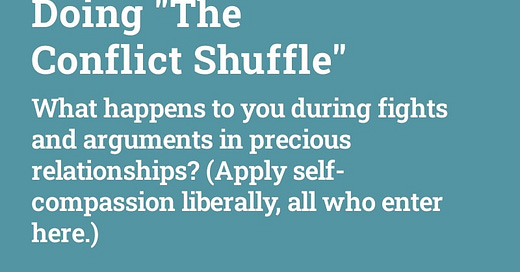Doing "The Conflict Shuffle"
What happens to you during fights and arguments in precious relationships? (Apply self-compassion liberally, all who enter here.)
Stop a moment with me and take a look at your auto pilot during heated conflict in your couple or family. If you’d like to do this, I hope it will be with an attitude of gentle curiosity, acknowledging your humanity, with self-kindness. Awareness is useful. Self-blame isn’t.
Fights and arguments with people you care deeply about can feel like a whirlwind sweeping you up, carrying you into a familiar yet unsettling dance. Let’s name that dance “The Conflict Default" - all those automatic responses that kick in when you're triggered by disagreement or tension. You may feel a surge of righteous anger, a desperate need to be understood, or a fear of things spiraling out of control. Your heart may race, your muscles tense, and your mind narrows its focus, zeroing in on the perceived threat.
The dance may include arms flailing, feet stamping, fists banging - I mean hopefully not! But take a look at your conflict default dance, and the dance that the people around you perform during fights and arguments. More common in the dance is a vocal component - raised voice, and facial expression.
Sometimes, your first response in a stressful moment with that one you love is a seemingly calming one. You might feel totally ready to listen attentively or offer reassurance. Even if you don’t feel ready, you may make a conscious effort to stay kind and composed. But then, if that doesn't work - if you feel unheard, misunderstood, or if the other person doesn’t seem to get it that you mean well - you may be quickly triggered and find yourself blowing up. Listen to me talking and singing about my experience with my husband here.
When this happens, it can feel shocking. You were doing so well, staying calm and reasonable, and suddenly it exploded. This rapid shift from composure to intense emotion can be jarring and confusing, leaving you wondering how things escalated so quickly. You’re less able to think well and take the interaction to a good place and you may also feel utterly thrown off as you attempt to get back to the day you had planned.
Heated conflict in precious relationships can feel terrible. Part of that is because we’re powerless to get what we most want. You may find yourself desperately trying to achieve certain outcomes that are impossible as soon as anyone is beyond a little bit upset. You push harder in your desire to get the other person to understand our perspective, believing that if you could just explain it clearly enough, of course they'd see what you mean. You might attempt to solve the problem then and there, convinced that hammering out a solution is the only way to end the distress you're feeling. Or you seek some form of acknowledgment or validation, craving a sign that despite this disagreement, you're still cared for and respected.
But here's the painful truth: in the heat of conflict, the goals we're so desperately pursuing are completely out of reach. Instead of understanding, we encounter resistance and anger. Our attempts to problem-solve are met with outright rejection. And that warmth or acknowledgment we crave? It’s further away than at any other time. We find ourselves trapped in a cycle of escalating emotions and ineffective communication, feeling increasingly helpless and misunderstood. The very actions we think will resolve the conflict often end up intensifying it, leaving us exhausted, discouraged, and no closer to the connection or resolution we seek.
Everything we try to accomplish during conflict is actually impossible, during and directly after the argument. At least until things calm down.
This might sound discouraging at first, but understanding this truth is the first step towards transforming our approach to conflict.
During heated conflict, all our energies are directed to these goals:
1. Get the other person to understand us
2. Convince them to agree with our perspective
3. Solve the problem during the fight
4. Receive acknowledgment, warmth, or love
But it’s impossible to achieve these things during conflict, as long as you or the other person is upset.
Each of these is a legitimate, cherished goal and perfectly reasonable to pursue at any other time. But not during fights and arguments.
This may sound completely counterintuitive. After all, isn't the whole point of an argument to resolve something? Shouldn’t we be trying to get the other person to understand our point of view?
To understand why these goals are unattainable in the heat of conflict, we need to look at what happens in our brains when we're upset. More about that in a future post.





So well said, you described to a "T" what I have experienced in relational conflict. And when one or the other is up out of (or down below) the window of tolerance, it is fruitless to try to do anything other than to soothe one's own disturbance and get back in that window. Looking forward to your upcoming post about the brain!
💯💯💯